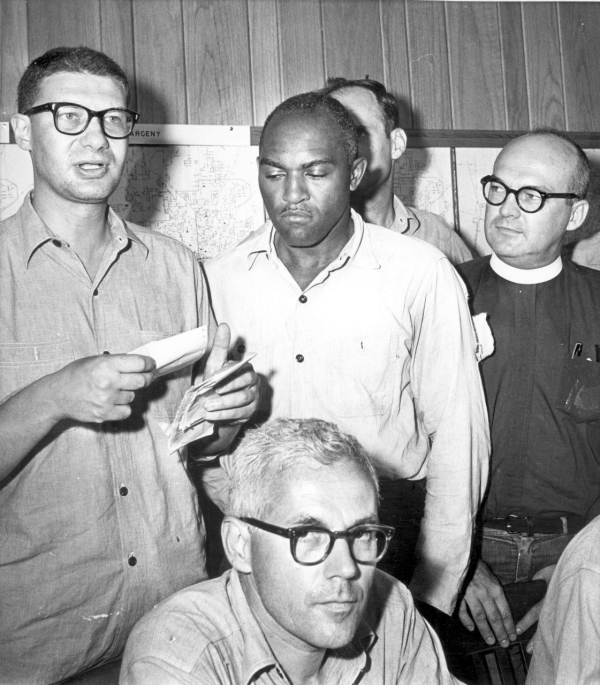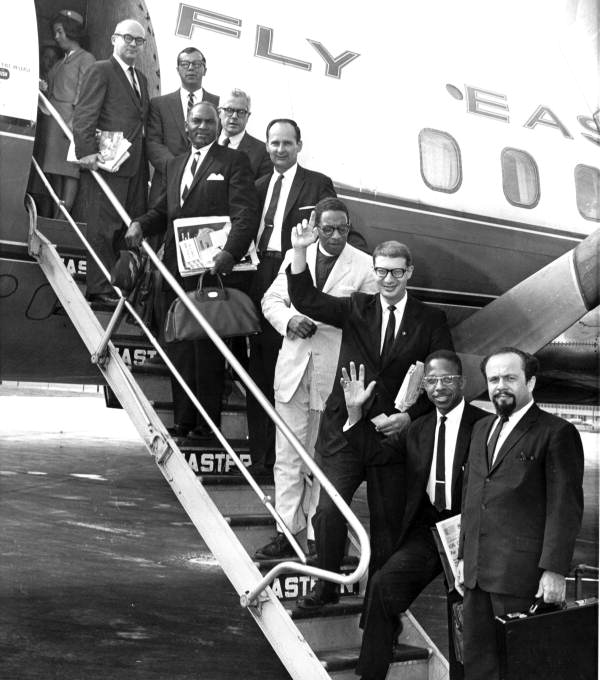
Freedom Rides
I was a Freedom Rider, Presbyterian Life, August 1, 1961
Two weeks ago today I was in jail.
Along with four other white ministers,
three Negro ministers, and two Jewish
rabbis, I was arrested for "unlawful assembly."
The nature of our unlawful assembly
was this: we were sitting in the
lobby of the Tallahassee Air Terminal
waiting to have a cup of coffee together
before taking a plane for New York.
We had arrived at the terminal about
twenty-four hours earlier, planning to
leave on a 3:25 plane that afternoon. The
airport restaurant had a sign on the door
marked "Closed," although several people
inside were eating. The restaurant
manager would not admit us, for this
was the afternoon of the monthly cleaning.
He was most apologetic, but he
couldn't open up again until 4:30.
At this point, our group had to make
a decision. Originally eighteen strong,
we had been traveling since Tuesday
morning as members of an interfaith
Freedom Ride, testing facilities for interstate
passengers at bus terminals all the
way from Washington, D.C., to Tallahassee,
Florida. We were now at the
last stop on our journey. Eight of the
group had obligations back home of
such a pressing nature that they had no
alternative but to fly out on the scheduled
flight. But ten of us decided to stay
over and test the restaurant.
See full article
 Freedom Rides in Retrospect, The Grain of Salt, Union Seminary Newsletter, October 1961
Freedom Rides in Retrospect, The Grain of Salt, Union Seminary Newsletter, October 1961
I have been asked by the editor of the
Grain to offer some reflections-in-retrospect
about my participation in a Freedom
Ride early this summer, What did I learn
from those swift moving, dramatic and
occasionally frightening episodes, that
might have ongoing meaning for my understanding
of Christian ethics and Christian
faith? I shall try to speak honestly
and I shall speak en famille, trying to
sort out a few of the reactions that
emerge after a passage of three months.
1. I must first point to a danger, of which the very writing of this article
is an example. This is the danger of taking a stand in a particular situation
and seeking to make spiritual capital out of it in lots of other situations.
I have often remarked about the easy way we flabby American Christians use the East
German Christians as a proof that Christian faith has vitality. I am afraid it is
similarly easy to let isolated actions of our own get us off the hook of continued
involvement. If someone says to me, "What are YOU doing about racial injustice?"
I hope I will have the grace not to respond self-righteously, "Look, Mac, I went on
a Freedom Ride." But it is painfully easy to let something that I did in June
become a rationalization for doing nothing in October. That I did something for
a few tumultuous days and nights, does not give me the privilege of disengaging myself
for the next few tumultuous months and years, even if in my weary moments I
wish it did. We cannot, in other words, let past involvements go bail for contemporary
responsibilities; the most we can do is draw on the past involvements as
resources for meeting contemporary responsibilities a little more creatively.
See full article.
Top Photo: Rabbi Israel Dresner, of Springfield, New Jersey, one of the nine clergymen jailed on a 60-day sentence rather than pay fines of $500 each, reads messages of support for their integration activities. The group was arrested in 1961 for a restaurant sit-in demonstration and have been free on $1,000 bonds. All but one of the white and Negro ministers are wearing regulation city prison clothing. Standing to the right from Rabbi Dresner are Reverend Petty D. McKinney from Nyack, New York; Reverend A. McArven Warner (only partly visible) from New York City; and Reverend Robert J. Stone from New York City. Seated is Dr. Robert McAfee Brown, faculty member of Stanford University. August 5, 1964. Description and photo courtesy of Florida Memory Project, State Archives of Florida.
Second Photo: These white and Negro clergymen elected to go to jail on a 60-day sentence rather than pay a $500 fine each. The ministers were arrested in 1961 when they refused to obey an order to end a sit-in at the airport restaurant. In a surprise court action they were set free after spending four days in jail on a 60-day sentence. From bottom to top are Rabbi Martin Freedman from Paterson, New Jersey; Reverend John W. Collier from Newark, New Jersey; Rabbi Israel Dresner of Springfield, New Jersey; Reverend Arthur L. Hardge from New Britain, Connecticut; Reverend A. McArven Warner of New York City; Reverend Petty D. McKinney from Nyack, New York; Dr. Robert McAfee Brown of Stanford, California; Reverend Wayne Hartmire, Jr. from Culver City, California; and Reverend Robert J. Stone of New York City. August 7, 1964. Description and photo courtesy of Florida Memory Project, State Archives of Florida.

